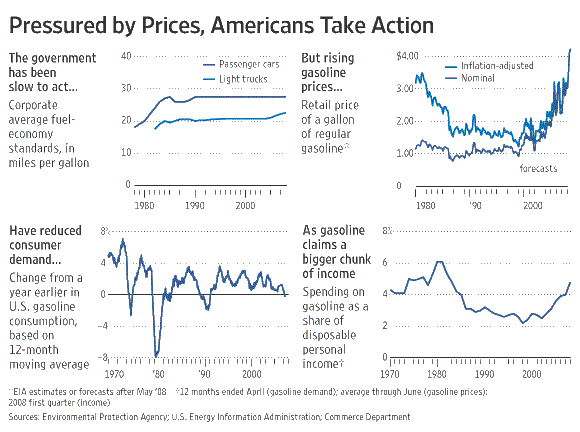Americans are conserving energy with fervor
WSJBy STEPHEN POWER, SARA MURRAY and SIOBHAN HUGHES
July 25, 2008; Page A3

WASHINGTON -- Congress will likely break for the summer without passing legislation to curb high gasoline prices. But Americans are fashioning their own energy policy, founded on conservation and support for more production.
A new Wall Street Journal/NBC news poll finds that energy -- including gasoline and utility costs -- ranks as the economic issue that voters say affects them the most personally.
New data indicate Americans are conserving energy with fervor.
The Energy Information Administration reported Wednesday that gasoline stocks posted a 2.8 million-barrel build in the week ended July 18, exceeding the 200,000-barrel increase forecast by analysts. In the past two weeks, the price of crude oil has fallen 14% from its New York Mercantile Exchange record close of $145.29 reached July 3, in part due to weakening demand. Thursday on the Nymex, crude oil for September delivery rose $1.05 per barrel, or 0.8%, to settle at $125.49.
The prolonged stalemate over energy policy raises the stakes for both parties heading into the fall election. Republicans, emboldened by polls indicating rising support among Americans for increased domestic drilling for oil and natural gas, are trying to cast Congress's Democratic leaders and the party's presidential candidate, Barack Obama, as obstructionists responsible for the country's energy crisis.
Polls indicate voters trust Democrats over Republicans, by substantial margins, to do a better job on energy. The Wall Street Journal/NBC News poll found that 42% of respondents preferred Democrats for dealing with energy policy, versus 22% favoring Republicans.
The poll indicated that Democrats' edge on the issue may be slipping; the July poll gave Democrats a 20-point advantage on the issue, versus a 28-point lead in a January poll by The Wall Street Journal and NBC News.
Polls of likely voters in four battleground states, conducted this month by Quinnipiac University in partnership with The Wall Street Journal and Washingtonpost.com, show voters in each state say energy policy is more important to them than the war in Iraq.
By margins of 22 to 31 percentage points, voters in each of the states -- Michigan, Colorado, Minnesota and Wisconsin -- said they support offshore oil drilling, according to the polls, which were released Thursday.
Both candidates face political trade-offs in addressing offshore drilling. Exploring off the coasts is more politically popular in industrial Midwest states, where voters worry mostly about high gasoline costs. But in key coastal states, voters worry more about the environmental risks. The shift in voter sentiment in the Midwest toward favoring offshore drilling could give a boost to Sen. McCain, as it is one of the primary issues that sets his energy plan apart from Sen. Obama's.
"These numbers point to an opening for Sen. McCain to redefine the economic issue as being about energy," said Peter Brown, assistant director of the Quinnipiac University Polling Institute.
In recent days, Sen. McCain's campaign has sought to highlight Sen. Obama's opposition to overturning a federal ban on offshore drilling, with a TV ad that shows a picture of a smiling Sen. Obama on the screen next to a gas pump while a voice blames "some in Washington" for "still saying 'no' to drilling in America."
The Obama campaign has fired back by pointing out Sen. McCain's far longer record of serving in Washington. Environmental groups also note that a 2007 analysis by the EIA concluded that opening drilling in the areas covered by the federal moratorium "would not have a significant impact on domestic crude-oil and natural-gas production or prices before 2030."
Prospects look dim for major changes in U.S. energy policy before Election Day.
Congress remained stuck Thursday in a partisan stalemate over whether to open more of the U.S. to drilling, as the Bush administration and many congressional Republicans favor, or to tap the emergency's petroleum stockpile and limit speculative oil trading, as Democrats prefer.
Thursday, House Republicans thwarted a Democratic measure that would have increased supply by releasing 70 million barrels of crude oil from the Strategic Petroleum Reserve, a network of salt caverns along the Gulf Coast where the government has been stockpiling oil in the decades since the 1973-74 Arab oil embargo.
Separate measures to curb speculative oil-futures trading appear unlikely to clear the Senate, where Republicans have vowed to block any energy legislation that lacks provisions to expand domestic drilling.
